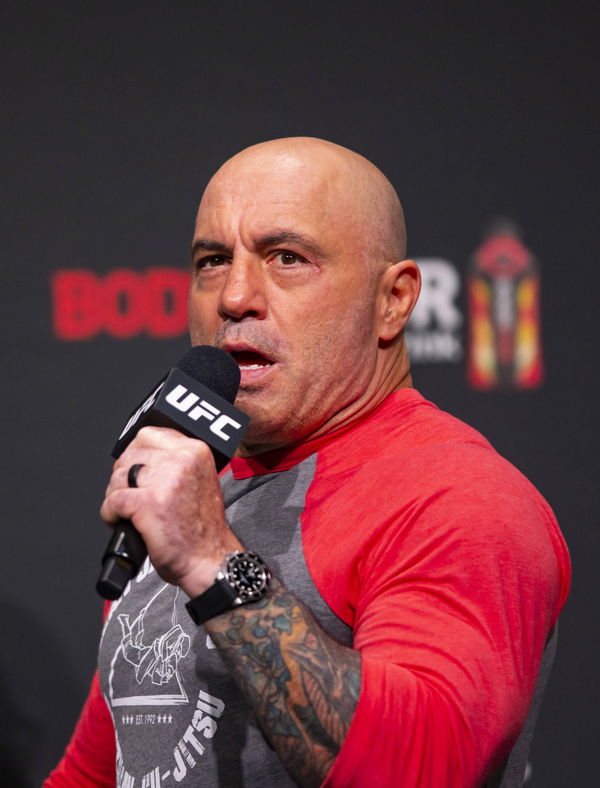
Imago
Credits: IMAGO

Imago
Credits: IMAGO
The debate between Joe Rogan and British novelist Douglas Murray has lingered in people’s minds since their disagreement over the Israel-Hamas conflict. While their exchange on The Joe Rogan Experience was already intense, things haven’t cooled down since—in fact, they’ve become more personal. Murray accused the JRE host of encouraging biased reporting. The jab certainly hit a nerve. And now, weeks later, Rogan has responded, exposing what he believes is a calculated attempt to corner him.
Watch What’s Trending Now!
In episode #2316 of his podcast, Joe Rogan discussed how Murray’s approach caught him off guard. Instead of delving into the actual political and military issues, the JRE host claims the discussion was diverted into a meta-debate over who is an expert, what should be discussed, and whether the show offered enough attention to pro-Israel speakers. “He used tactics rather than facts,” Rogan stated, adding that Murray’s true strategy was to instantly put him on the defensive. “So, the tactic was an appeal to experts like that. And there was also saying that the coverage was imbalanced—because I didn’t have enough people that were pro-Israel.”
ADVERTISEMENT
The UFC commentator pushed back, citing guests such as Ben Shapiro, Jordan Peterson, and Coleman Hughes as clear pro-Israel voices who have appeared on his show. “I thought about it afterwards—I’m like, I know quite a few. There was Jordan, Ben Shapiro, there was Coleman Hughes— there have been quite a few people that are pro-Israel,” he said. “It’s not about being anti-Israel,” Joe Rogan emphasized. For him, the purpose isn’t to meet a political quota; it’s to have honest talks, no matter where they lead.

USA Today via Reuters
MMA: UFC 274 – Weigh Ins, May 6, 2022 Phoenix, Arizona, USA UFC announcer Joe Rogan during weigh ins for UFC 274 at the Arizona Federal Theatre. Mandatory Credit: Mark J. Rebilas-USA TODAY Sports, 06.05.2022 15:26:32, 18218606, NPStrans, UFC, Joe Rogan, MMA PUBLICATIONxINxGERxSUIxAUTxONLY Copyright: xMarkxJ.xRebilasx 18218606
However, there is more to it than simply defending his guest list. Rogan was visibly irritated by Murray’s framing of the entire debate. He described it as a purposeful tactic to move the narrative away from real issues and toward the abstract world of credentials and gatekeeping. Rogan also attacked the notion that someone like Murray should be able to judge what constitutes historical reality. In fact, he decided to drop a final verdict on the controversy once and for all by bringing his own educational background to the table.
ADVERTISEMENT
ADVERTISEMENT
Joe Rogan goes off on Douglas Murray and expert credentials
After calling out what he saw as a deceptive setup, Joe Rogan did more than just defend his own decisions; he also took aim at the very foundation of Murray’s criticism. If the British author wanted to talk about gatekeeping and expertise, Rogan was prepared to burn the whole thing down. What was the first domino he pushed? Murray’s own credentials. The Briton presented himself as someone speaking on behalf of history and accuracy, but the UFC commentator didn’t buy it. “He’s got a degree in English,” Rogan said, “unless we’re talking about Shakespeare, shut the f— up.” That wasn’t just a simple attack; it was the JRE host’s way of turning the issue on its head. If Murray wasn’t a credentialed expert in what he spoke, why should Rogan be held to a different standard?
This was not about pettiness. Joe Rogan made a bigger argument about how the internet changed who can talk and be heard. “I don’t have a degree in anything,” he said, “but there are things I am an expert in.” He compared it to martial arts, adding that if someone wanted to confront him there, they had better be as skilled as Gordon Ryan. Yes, it was an analogy, but it was a pointed one. The JRE host believes that authority is not defined by what is written on paper, but by knowledge earned through real-world experience and a willingness to debate openly. He sees his platform as a place where hard facts can be revealed, rather than a lecture hall for credentialed elites.
ADVERTISEMENT
Of course, this does not sit well with folks like Murray. The British journalist has long argued that giving microphones to “counter-historical” voices, particularly when addressing personalities such as Winston Churchill or the Israel-Gaza conflict, might result in the spread of dangerous narratives. However, Murray’s issue, according to Joe Rogan, was not about facts but about control. Rogan feels that the advent of podcasts and independent platforms has made it tougher for traditional academics to control ideas. And as those old rules crumbled, folks like Murray panicked. They now fight credentials rather than ideas. But what do you think? Do you believe Joe Rogan is right? Let us know in the comments.
ADVERTISEMENT
ADVERTISEMENT
ADVERTISEMENT